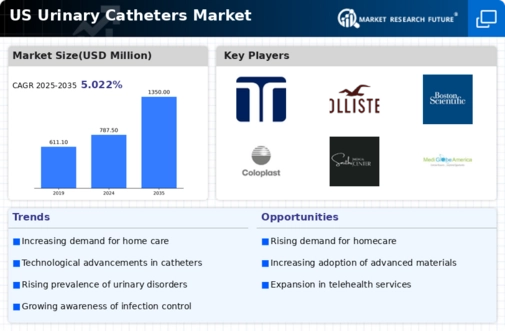The US Urinary Catheters Market is characterized by a diverse and competitive landscape driven by increasing demand for urinary catheterization in various healthcare settings. Factors such as the rising prevalence of urinary incontinence, neurological disorders, and an aging population contribute to the growth of this market. The competitive insights highlight the strategic positioning of key players, their innovations, and market penetration strategies to capture a significant share. An analysis of these companies reveals a mix of established firms and emerging entities, each leveraging unique strengths, product offerings, and distribution channels to meet the needs of healthcare providers and patients across the United States. Teleflex is a notable player in the US Urinary Catheters Market, recognized for its advanced medical devices and focus on healthcare solutions catering to various urological needs. With a robust portfolio that encompasses different types of catheters, Teleflex has established itself as a trusted brand among healthcare professionals. The company's strong commitment to innovation has led to the development of high-quality products designed to improve patient outcomes and ease of use. Furthermore, Teleflex's expansive distribution network and partnerships with healthcare providers enhance its market presence, allowing it to effectively reach a broader audience and respond swiftly to evolving market dynamics. The firm’s strong reputation and extensive experience in the market position it favorably against competitors, enabling it to maintain a prominent role in the urinary catheters segment. Hollister also plays a significant role in the US Urinary Catheters Market, known for its comprehensive range of urological products that prioritize patient comfort and efficacy. The company's offerings include various catheter options, drainage bags, and accessories, reflecting its commitment to providing holistic solutions for urinary care. Hollister's strong both direct and indirect marketing strategies allow for effective penetration into diverse healthcare settings, such as hospitals and long-term care facilities. The company thrives on its reputation for quality and user-centric design, which has fostered strong relationships with healthcare providers. Additionally, Hollister remains proactive in expanding its market position through potential mergers and acquisitions to enhance its capabilities and diversify its product lines within the urinary catheter sector. Its established brand recognition and ongoing innovation place Hollister in a competitive position within the US market, ensuring it continues to meet the evolving needs of patients and healthcare professionals alike.


















